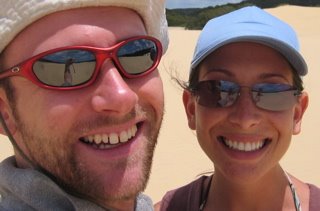Af-flu-en-za (n). 1. The bloated, sluggish and unfulfilled feeling that results from efforts to keep up with the Joneses. 2. An epidemic of stress, overwork, waste and indebtedness caused by the dogged pursuit of the Australian dream. 3. An unsustainable addiction to economic growth.
Affluenza
We eat-out more than we do in. $6K honeymoons become the expectation. Louis Vuitton is a household name. Baby bonuses are spent on flat screen TV’s. Cap plans have saved us from $100 mobile bills. We drive 4WD’s because they are safer. People pay 18% interest on their credit cards. We mortgage our lives.
The banks love it! Each year they set a new billion-dollar record profit fuelled by this disease. “Waiting is boring, get what you want now with a personal loan from St George”. No wonder household post-tax savings have gone from 16.4% in 1975 to -3.2% in 2004 (even though real incomes have almost doubled in the same period). We no longer need to save for anything; we simply get it now on credit. Instead we save by shopping for great deals at the sales. A friend of mine recently told me that he bought himself a bargain in the USA! He only paid USD$200, compared to AUD$500. That is a bargain, until you hear that all he got was a pair of jeans. As we no longer have to wait to get what we want, we don’t have time to assess all the pros and cons of spending our hard-earned savings. As a result, we have more, are satisfied less, and we waste more.
We have lost perspective of how rich we really are. 62% of Australians claim they can’t afford everything they need – and 46% of our richest 20% of households agree. By world standards most of us are filthy rich!
The side-affects of this disease are nasty! I owe I owe it’s off to work I go … Debt and overwork are big problems! In 1990 average household debt:income was 56%, it’s now 125%. Despite having a reputation of being lazy and leisurely, Australians now work on average longer than any other country in the developed world. We have less public holidays than Japan (15) and most EU countries (12). EU countries average 5 weeks annual leave, with Germany and Holland getting 6; in 2002, only 39% of Aussies managed to take their 4 weeks.
This disease (and the burden of paying it off) also take their toll on our health as we work longer and harder, our families and friendships when we are not around (and worn out when we are) and our communities. Do you think the 45% of us who work more than 50 hours a week have time to coach little Johnny’s soccer team?
The smart guys from the Australia Institute know it, Ross Gittens often writes about it, the Downshifters live it, and Simple Plan are singing about it:
Tell me what's wrong with society
When everywhere I look I see
Rich guys driving big SUVs
While kids are starving in the streets
No one cares
No one likes to share
I guess life's unfair
Is everybody going crazy?
How come the Christians don’t see it? Are our preachers teaching it? Jesus speaks more about money than any other topic doesn’t he? You know what he says:
“don’t store up treasures here on earth … So I tell you, don't worry about everyday life--whether you have enough … Why be like the pagans who are so deeply concerned about these things?”
"I tell you the truth, it is hard for a rich man to enter the kingdom of heaven."
As followers of Christ, our attitudes and activities towards money must go beyond giving 10% to reach the 10%. We must live within our means. We must spend like salt and light. We must elect governments for better reasons than keeping interest rates low. We must become ‘worldly’ to see how wealthy we really are and help those who are not. We must serve only one master!
“No one can serve two masters. For you will hate one and love the other, or be devoted to one and despise the other. You cannot serve both God and money.”
~ Jesus of Nazareth





